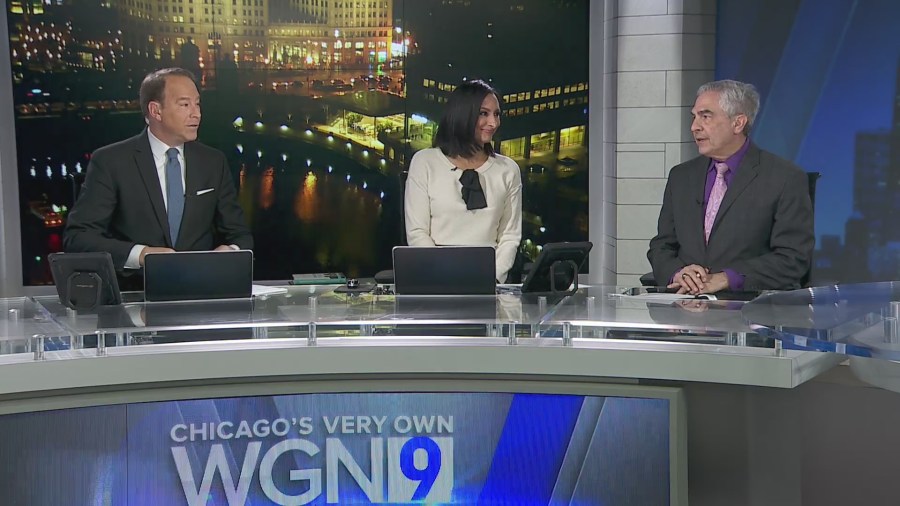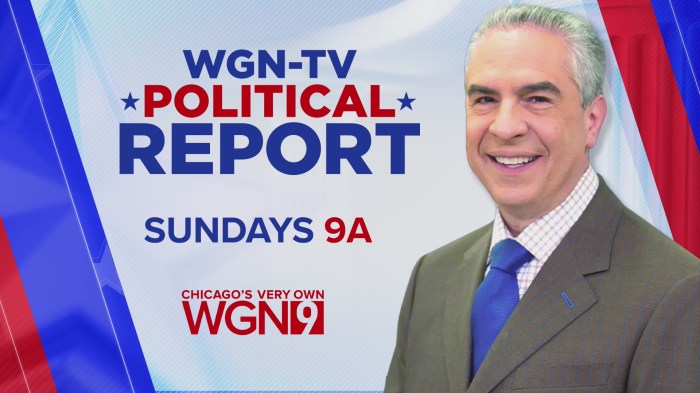Paul Lisnek on a potential shakeup at CPS, the likely end of ShotSpotter, the presidential race & more – Paul Lisnek, a prominent Chicago commentator, dives into a range of critical issues impacting the city, from the potential shakeup at Chicago Public Schools (CPS) to the likely end of ShotSpotter technology and the implications of the presidential race. Lisnek’s analysis offers valuable insights into the complexities of these issues and their potential impact on Chicago residents.
The discussion delves into the factors driving the CPS shakeup, the arguments for and against ShotSpotter, and the potential outcomes of the presidential race. Lisnek also touches on other significant topics affecting Chicago, providing a comprehensive overview of the city’s current landscape.
Paul Lisnek’s Analysis of CPS Shakeup
Paul Lisnek, a prominent Chicago media personality, has been closely following the recent shakeup at Chicago Public Schools (CPS). He has provided insightful commentary on the potential implications of these changes, highlighting the factors driving them and the potential consequences for students, staff, and the broader community.
Factors Driving the CPS Shakeup
Lisnek’s analysis points to several key factors driving the shakeup at CPS. These include:
- Declining Enrollment:CPS has experienced a significant decline in enrollment in recent years, putting pressure on the district’s budget and resources.
- Academic Performance:Concerns about academic performance, particularly in certain areas of the city, have also contributed to the pressure for change.
- Budgetary Constraints:The district has faced ongoing budgetary challenges, including funding cuts and increased costs for pensions and healthcare.
- Political Pressure:The shakeup has also been influenced by political pressures, including calls for greater accountability and transparency.
Potential Consequences of the CPS Shakeup
Lisnek has highlighted the potential consequences of the shakeup for various stakeholders:
- Students:The shakeup could impact students in a number of ways, including changes to school programs, staffing, and resources. Lisnek emphasizes the need to ensure that students are not negatively affected by these changes and that their educational needs are met.
- Staff:The shakeup could lead to changes in staffing levels, including potential layoffs or reassignments. Lisnek underscores the importance of ensuring that staff members are treated fairly and that their concerns are addressed.
- Community:The shakeup could also have broader implications for the community, impacting access to educational resources and opportunities. Lisnek stresses the need for transparency and community engagement throughout the process.
Lisnek’s Assessment of Current Leadership and Potential Improvements
Lisnek has expressed concerns about the effectiveness of the current CPS leadership, pointing to challenges in addressing the issues mentioned above. He has suggested that new leadership could bring fresh perspectives and approaches to tackling these challenges. Lisnek believes that a new superintendent should focus on:
- Improving Academic Performance:Implementing strategies to improve student achievement across all schools.
- Addressing Budgetary Constraints:Finding creative solutions to address the district’s financial challenges while ensuring that resources are allocated effectively.
- Engaging the Community:Building strong relationships with parents, community organizations, and other stakeholders to ensure that their voices are heard.
The End of ShotSpotter in Chicago
The controversial ShotSpotter technology, designed to detect gunshots and alert authorities, is likely on its way out in Chicago. This decision follows years of debate about its effectiveness and potential for racial bias, with critics arguing that it disproportionately targets minority communities and fails to deliver on its promises of crime reduction.
Arguments for and Against ShotSpotter
The use of ShotSpotter has been a subject of intense debate, with proponents and opponents presenting compelling arguments.
Arguments in Favor of ShotSpotter
- Increased Police Response:ShotSpotter’s ability to pinpoint the location of gunshots allows for faster police response, potentially reducing the severity of crimes and apprehending perpetrators more quickly.
- Improved Crime Data:The technology provides valuable data on gun violence, enabling law enforcement to identify hotspots and allocate resources more effectively.
- Deterring Gun Violence:The presence of ShotSpotter is believed to deter some individuals from engaging in gun violence, knowing that their actions will be quickly detected.
Arguments Against ShotSpotter
- Racial Bias and Over-Policing:Critics argue that ShotSpotter disproportionately targets minority communities, leading to increased police presence and surveillance in those areas, potentially exacerbating racial disparities in policing.
- False Positives and Inaccurate Data:The technology is prone to false positives, misidentifying non-gunshot sounds, leading to unnecessary police interventions and potential harassment of innocent individuals.
- Lack of Evidence for Crime Reduction:Despite claims of effectiveness, independent studies have shown limited evidence that ShotSpotter significantly reduces crime rates.
Impact of ShotSpotter’s Removal
The potential impact of removing ShotSpotter is a complex issue with both positive and negative aspects.
Explore the different advantages of Crews respond to multi-car crash involving pedestrian that can change the way you view this issue.
Potential Benefits
- Reduced Racial Bias in Policing:Removing ShotSpotter could lead to a reduction in over-policing of minority communities, addressing concerns about racial disparities in law enforcement.
- Increased Trust in Law Enforcement:By reducing the reliance on a technology that is perceived as biased and ineffective, trust between communities and law enforcement could be strengthened.
- Focus on Alternative Crime Prevention Strategies:The removal of ShotSpotter could encourage the adoption of more effective and community-based crime prevention strategies, such as social programs and community policing initiatives.
Potential Concerns
- Impact on Police Response Time:The absence of ShotSpotter might lead to slower police response times, potentially increasing the severity of gun violence incidents.
- Loss of Crime Data:Removing the technology would result in a loss of valuable data on gun violence, potentially hindering efforts to understand and address crime patterns.
- Public Perception of Safety:Some residents might perceive the removal of ShotSpotter as a sign of reduced commitment to public safety, potentially leading to increased fear and anxiety.
Paul Lisnek’s Perspective on the Presidential Race: Paul Lisnek On A Potential Shakeup At CPS, The Likely End Of ShotSpotter, The Presidential Race & More
Paul Lisnek, a veteran Chicago journalist and political commentator, offers a nuanced perspective on the current presidential race, considering its potential impact on Chicago and its communities. He emphasizes the importance of understanding the national context and its implications for local issues, highlighting how the national political climate can influence local policies and priorities.
The Impact of the Presidential Race on Chicago
The presidential race often overshadows local issues, but Lisnek argues that the national political landscape has a direct impact on Chicago. He cites the ongoing debates on gun control, immigration, and healthcare as key examples. For instance, the debate on gun control has a significant impact on Chicago, a city struggling with gun violence.
The national dialogue surrounding gun control can influence the policies implemented at the local level, impacting resources available to address the issue.
“The presidential race is not just a national conversation, it’s a local one too. What happens at the national level has a direct impact on our city, on our lives,”
Lisnek emphasizes, underscoring the interconnectedness between national and local politics.
Lisnek’s Predictions for the Upcoming Election, Paul Lisnek on a potential shakeup at CPS, the likely end of ShotSpotter, the presidential race & more
Lisnek, known for his insightful analysis, predicts a close race with potential for unexpected outcomes. He suggests that the election could hinge on key issues such as the economy, healthcare, and social justice. He emphasizes the importance of voter turnout and engagement, highlighting how the outcome could be determined by the participation of specific demographics.
“This election is going to be a tight one. The outcome could come down to a few key states, and it’s going to be important for people to get out and vote.”
Lisnek’s analysis suggests that the election could have significant implications for Chicago. He highlights the potential impact on funding for local programs, the direction of national policies, and the overall political climate.
Other Key Topics Discussed by Paul Lisnek

Paul Lisnek’s analysis extended beyond the immediate issues of CPS shakeup and ShotSpotter’s potential demise. He delved into other key topics affecting Chicago, highlighting their potential impact on the city’s residents. These discussions, while not the primary focus, provided valuable insights into the broader political and social landscape of Chicago.
The City’s Budget and its Implications
Paul Lisnek discussed the city’s budget, highlighting the challenges of balancing competing priorities amidst limited resources. He emphasized the strain on public services, including education, public safety, and infrastructure, due to budget constraints. Lisnek’s perspective underscored the need for efficient resource allocation and creative solutions to address these challenges.
| Topic | Lisnek’s Perspective | Potential Impact | Relevant Sources |
|---|---|---|---|
| City Budget | Limited resources necessitate prioritization and creative solutions for public services. | Potential cuts in public services, impacting education, safety, and infrastructure. | Chicago Tribune, WBEZ, City of Chicago Budget Documents |
| Public Safety Initiatives | Advocates for a comprehensive approach to public safety, including community policing and investment in social programs. | Improved community relations, reduced crime rates, and a safer environment for residents. | Chicago Police Department, Chicago Crime Commission, National Institute of Justice |
| Affordable Housing Crisis | Highlights the need for affordable housing solutions, including increased development and rent control measures. | Improved housing affordability, reduced homelessness, and greater access to safe and stable housing. | Chicago Housing Authority, National Low Income Housing Coalition, Zillow Research |
| Transportation Infrastructure | Emphasizes the importance of maintaining and improving Chicago’s transportation infrastructure, including public transit and road networks. | Improved mobility, reduced traffic congestion, and enhanced accessibility for residents. | Chicago Department of Transportation, Metropolitan Planning Council, Regional Transportation Authority |
Conclusion

Lisnek’s analysis provides a compelling perspective on the challenges facing Chicago, offering a roadmap for understanding the potential implications of these critical issues. From the future of education to the effectiveness of crime prevention strategies, Lisnek’s insights offer a valuable lens for navigating the complexities of Chicago’s current landscape.
FAQ Section
What are the potential consequences of the CPS shakeup?
The potential consequences of the CPS shakeup are far-reaching and could impact students, staff, and the broader community. Lisnek highlights the need for a thorough assessment of the current leadership and potential improvements under new leadership.
How will the removal of ShotSpotter affect crime rates?
The impact of ShotSpotter’s removal on crime rates is a subject of debate. Some argue that it will lead to an increase in crime, while others believe it will have little impact. Lisnek analyzes the potential impact on both crime rates and public perception of safety.
What are the key issues in the presidential race that are relevant to Chicago?
Lisnek examines the key issues in the presidential race that have the potential to impact Chicago, such as education, healthcare, and economic development. He also discusses the potential implications of the election for Chicago residents.
 CentralPoint Latest News
CentralPoint Latest News
